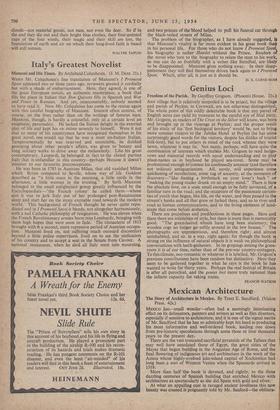Genius Loci
Freedom of the Parish. By Geoffrey Grigson. (Phoenix House. 21s.) ANY village that is relatively unspoiled is to be prized, but the village and parish of Peylint, in Cornwall, are not otherwise distinguished. The whole point of this oddly delectable book is that any parcel of English acres can yield its treasures to the careful eye of filial piety. Mr. Grigson, as readers of The Crest on the Silver will know, was born and brought up in the vicarage at Peylint; and the proper result of his study of his 'first biological territory' would be, not to bring more summer visitors to the Jubilee Hotel at Peylint (he has some surprisingly good words for the visitors, despite his dislike of tourist folk-lore), but to put others in mind of the rock whence they were hewn, wherever it may lie. Not many, perhaps, will have quite the combination of interests which enables Mr. Grigson to read hedge- rows and manorial records with equal understanding and to play place-names as in boyhood he played sea-trout. Some may be professional enough to contest his confessedly amateur (and therefore not tedious) antiquarianism. All, surely, will experience some quickening of recollection, some tug of ancestry, at the moments of discovery—"like finding a birthniark on your lover's back " of "making the young reader drunk on an empty mind." There is here the absolute love, on a scale small enough to be fully savoured, of a familiar turn in the road; and the recapture of the passionate curiosi- ties of youth that began, like life, on the water, and then passed to the stream's banks and all that grew or lurked there, and so to river and road as human communications, and to the living elements of land- scape that come before aesthetics.
There are prejudices and predilections in these pages. Here and there there are infelicities of style, but there is more that is memorably good. "The green-haired wheels have long been stationary, the wooden cogs no longer go softly around in the low houses." The photographs are unpretentious, and therefore right; and almost uninhabited, and so, in a way, right again: for though the book is strong on the influence of natural objects it is weak on philosophical conversations with leech-gatherers. In its gropings among the grass- roots it is of our time, rather than of the pre-war country-cottagery. To this climate, neo-romantic or whatever it is labelled, Mr. Grigson's previous contributions have been random but distinctive. Here they seem to be gathered together in what he says is the book he has wanted to write for thirty years. Perhaps the real festival of Britain is after all parochial, and the genius loci more truly national than the infinite capacity for taking trains.
FRANCIS WATSON


































 Previous page
Previous page